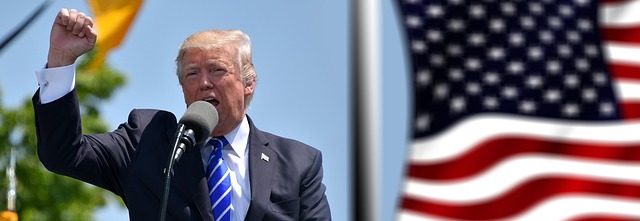“To me, the most beautiful world, and I’ve said this for the last couple of weeks, in the dictionary today… is the word tariff. It’s more beautiful than love. It’s more beautiful than anything. It’s the most beautiful word.” 10 years ago, it was unfathomable that a Republican nominee for president and former Republican president would speak about tariffs in such a high regard. After all, the Republican Party was the party of free markets. They advocated for less taxes, regulations, and other forms of government interventionism in the economy. That was the guiding economic principle that had defined the Republican party from 1980 onwards. Ronald Reagan, George W Bush, and George H.W. Bush all proudly defended the free market, including free trade specifically. In 2012, 4 years before Trump became the Republican nominee, Mitt Romney pushed back on the debate stage to Barack Obama’s proposed tax benefits for companies who manufactured in the United States. Over the course of only a few years, the Republican party’s initial position of “All companies should pay less in taxes, not just those who manufacture here” soon became “companies who offshore should be financially penalized by the United States federal government.”
When trying to explain this seemingly 180 degree shift in Republican policy, it’s important to first understand the broader populist undercurrent that swept the Republican party. Trump’s campaign relied heavily on “us vs them” messaging. This was most clearly evident in his rhetoric on immigration, but this tribal lens is what ended up defining the Trump movement on a much broader scale. As a Trump supporter said recently at a rally, “What we’re seeing is that realignment, not left-to-right but vertical alignment, we have oligarchs and the establishment and the permanent political class, versus the people.” Trump’s movement was in opposition to the “permanent political class” or the “elites.” These elites were often defined as career politicians, but many also lumped the wealthy into this category of “elites”. The “us vs them” mentality has now been applied to large corporations and the uber wealthy groups who’ve been under the ire of Democrats for decades, but are now being vilified by Republicans. This same mentality was also applied to other countries. Trump often claimed that Canada, Mexico, and many other countries were “screwing us over” due to the arguably disproportionate benefit they received from NAFTA and other trade agreements between the United States and other countries in North America. Regardless of whether this was true or not, the Republican’s newfound opposition to American trading partners and large corporations created the perfect storm for the pro-tariff policy platform that has permeated the Republican Party for almost a decade.
Republican opposition to large corporations has also resulted in economic populism becoming more popular in the Republican Party writ-large. Whether it’s on trade, tax policy, or government regulation or large companies––Trump has tried to move further left than mainstream Democrats. Take Lina Khan, for example, the current chair of the Federal Trade Commission. Many of Kamala Harris’ surrogates, including Mark Cuban, openly advocated for Lina Khan to be replaced in a Harris administration, claiming that she’s not “business-friendly” enough. Lina Khan used her role as chair of the FTC to advocate for historic, progressive policy, including a ban on non-compete clauses and limiting many corporate mergers, especially for Big Tech and the pharmaceutical industry. While Harris surrogates claimed that Khan was too far to the left, and Harris herself remained quiet on the issue, JD Vance claimed that Khan was “doing a pretty good job” and even hinted at possibly keeping her during a Trump-Vance administration. This is just another example of how the anti-corporate mindset has become mainstream in the Republican party, a radical shift from only 10 years prior.
Through economic populism, Republicans have made it abundantly clear that the party is opposed to the power of large corporations. Through their foreign policy isolationism, they have also clearly shown that the party is opposed to the United States being seriously involved with other nations. The Republican administration prior to President Trump, the Bush administration, launched a war against Iraq, dethroning Saddam Hussein and attempting to find weapons of mass destruction. Trump would later say that the Bush administration possibly made the “worst decision” in presidential history. JD Vance said that the war in Iraq was “the biggest world historical catastrophe.” Much of this rhetoric has been even stronger than the rhetoric Democrats use when criticizing American intervention in Iraq and the Middle East.
The significantly reduced appetite for military interventionism in the Republican Party has also coincided with a more isolationist sentiment to pull away from world affairs entirely. President Trump has frequently expressed his desire to possibly withdraw from NATO and the United Nations–a proposal inconceivable to Republicans only years ago. This is part of a broader trend in which Republican rhetoric has become increasingly critical of international institutions and global commitments. Just as Trump’s tariffs signaled a rejection of free trade orthodoxy, his critiques of NATO and the United Nations reflect a similar departure from the Republican Party’s platform of American interventionism.
Over the last decade, the Republican Party has transformed from a champion of global free markets and American-led international coalitions to a party defined by economic populism and foreign policy isolationism. This shift, once unimaginable, underscores the growing influence of Trump-era populism, where the priorities of the party no longer align with its pre-2016 platform. This likely permanent shift leaves many traditional Republicans feeling abandoned by the party they once stood with––the party which championed free trade and global engagement just a few years ago.
Sources.
- https://www.youtube.com/watch?v=hBMoPUAeLnY&t=2500s
- https://www.newyorker.com/news/the-political-scene/trumps-final-days-on-the-campaign-trail?utm_source=chatgpt.com
- https://www.tradesecretsandemployeemobility.com/the-future-of-federal-non-compete-bans-in-a-trump-administration#:~:text=FTC%20Chair%20%26%20Commissioners,district%20courts%20blocking%20its%20implementation
- https://www.cnbc.com/2024/02/27/ftc-chair-lina-khan-takes-victory-lap-on-blocking-nvidia-arm-merger.html
- https://kffhealthnews.org/news/article/a-more-aggressive-ftc-is-starting-to-target-drug-mergers-and-industry-middlemen/
- https://thehill.com/policy/technology/4491363-vance-biden-ftc-chief-is-doing-a-pretty-good-job/
- https://nypost.com/2024/10/15/us-news/j-d-vance-hints-elon-musk-and-lina-khan-could-be-in-trump-admin-i-agree-with-them-both-on-some-issues/
- https://www.politico.com/blogs/south-carolina-primary-2016-live-updates-and-results/2016/02/2016-south-carolina-trump-george-w-bushs-iraq-219475
- https://www.youtube.com/watch?v=fRyyTAs1XY8&t=8289s





























